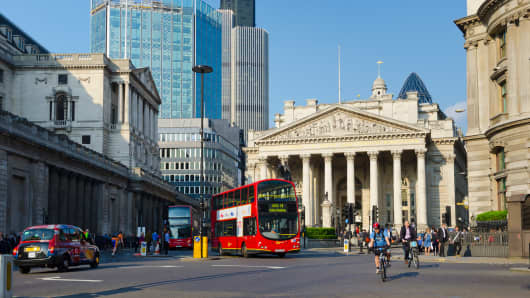The policy of quantitative easing (QE) pursued by the Bank of England since 2008 has hurt the nation's savers and any further stimulus would have marginal benefits, according to evidence heard by U.K. policymakers.
The central bank cut interest rates to just 0.5 percent after the 2008 financial crisis and embarked on a series of asset purchases that have so far totaled 375 billion pounds ($600 billion).
The knock-on effect has been for yields for 10-year gilts (U.K. government bonds) to fall to 2 percent and to dip below 1.5 percent in July and August last year, the lowest level since Bank of England records began in 1703.
"QE (quantitative easing) is an inflationary policy as they admit, and with inflation currently running higher than the increase in wages, it isn't just savers and pensioners, it's everybody who is suffering and feeling the pinch," Simon Rose from the group Save our Savers said at a meeting of the U.K. parliament's Treasury committee.
He argued that millions are now worse off.
"From the saver's point of view, QE has been an utter disaster, both whether they're saving through a pension fund or whether they're saving through cash deposits."
With inflation now above the current interest rate, Rose said that the resulting negative interest rate means that savers are unable to preserve the value of their cash.
"It's quite an appalling confiscation of wealth," he said.
The Bank of England told CNBC that QE had given a significant boost to the U.K. economy, even after taking into account the effects on different groups in society, and on pension funds.
"Without QE, growth would have been lower, unemployment higher and more business would have failed. This would have hurt every group in society including savers and pensioners," a spokesperson at the bank told CNBC.com.
In a report published in July last year, the central bank said QE had boosted the value of stocks and bonds by 600 billion pounds ($970 billion).
But it also suggested that since financial wealth outside pension funds are heavily skewed, with the top 5 percent owning 40 percent of these assets, the program may have especially helped the rich.
(Read More: Bernanke's 'Ruinous' QE Will Lead to Rapid Inflation: SocGen's Albert Edwards)
The same report highlighted that QE had a broadly "neutral effect" on pension funds, increasing both the value of their assets and liabilities. However, representatives from the National Association of Pension Funds (NAFP), speaking at the committee, disagreed.
"Deficits in defined pension schemes have increased by around 90 billion pounds," Mark Hyde-Harrison, chairman of the NAPF said. That equates to about $140 billion.
Defined benefit pensions are where an employer promises a specified monthly benefit on retirement that is determined by a formula using factors such as employment length and salary history.
The high gilt prices and lower yields had hurt investment earnings for pension funds, according to the NAPF. This had increased pension deficits significantly and companies were having to direct important resources away from job creation and innovation into filling pension holes, NAFP argued.
"We've got the Bank of England owning a little over a third of the gilts issuance, they're the only issuer, and most of the people buying them are the pension funds and the long term insurance companies. So the market, which is determining the market price, may not be as diverse as we would normally like," Hyde-Harrison said.
(Read More: QE Goes Local: Towns Coin Their Own Currencies)
Speakers at the committee also warned that gilt yields could suddenly spike and that could put the central bank in a very difficult position, with some arguing for direct money printing rather than bond buying.
"More direct use of newly created money would have been, in my view, more stimulatory," Ros Altmann, the director general at SAGA, an organization that provides services for the over-50's and also campaigns on their behalf, told the committee.
"Helicopter drop would have been far more effective than buying gilts and probably would had less dangerous negative side effects."
Altmann was incredulous at how a policy that has produced little to no growth in the U.K. economy could have had no parliamentary debate or democratic scrutiny.
(Read More: UK GDP Drop Raises Risk of Triple-Dip Recession)
"What we've got is this vicious spiral, I call it a bit of a death spiral, with pension funds who've got billions of assets but not enough to cover their ever rising liabilities, which are mark-to-market at ever decreasing gilt yields," she said.



